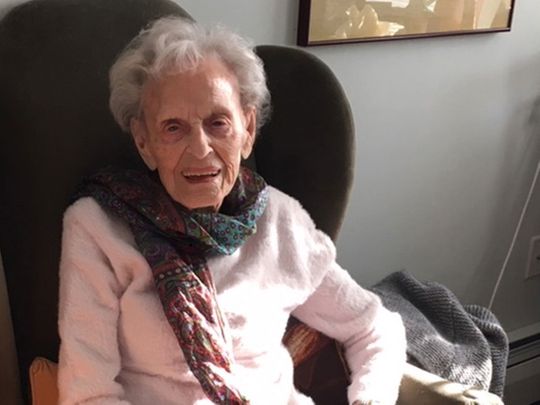
We are in a pandemic today that the world hasn't seen the likes of in 102 years.
Mildred Geraldine "Gerri" Schappals is one of the few people in the world who has survived both. The 102-year-old New Englander lived through a severe bout of the flu during the 1918 pandemic as a baby. And now, a century later, punctuated by two bouts of cancer, Schappals also has recovered from COVID-19 in the pandemic of 2020.
Schappals - an Irish Catholic known for her witty one-liners - is the oldest resident at the Huntington at Nashua, a retirement and assisted-living community in Nashua, N.H.
"I don't think of myself as old," said Schappals, who is moderately deaf and provided an interview through her daughter, Julia Schappals.
Julia Schappals, 68, calls her mother feisty and tough and "an example of a good, fighting treasure."
I never had colds or illnesses until I got cancer, and even then I pulled through. It's either that or Mother Nature thinks I died in 1918, so she ignores me.
She is an anomaly, and not just because of her age. The elder Schappals was not particularly health-conscious throughout her life, yet she seems to have a bulletproof immune system. She credits that to the 1918 flu pandemic, her daughter said.
Julia Schappals cannot recall a single time when her mother got sick with a respiratory ailment like the cold or flu. In fact, Gerri Schappals had disdain for anyone who did get sick.
"I really think that having the 1918 flu strengthened everything about me," she said. "I never had colds or illnesses until I got cancer, and even then I pulled through. It's either that or Mother Nature thinks I died in 1918, so she ignores me."
Who is Gerri Schappals ?
Gerri Schappals was born in Worcester, Mass., on Jan. 18, 1918, when the First World War was raging, and women didn't have the right to vote. Eleven months after she was born - in November, the same month when the war officially ended - baby Gerri, her mother and her teenage brother, Joseph, came down with the dreaded flu. The virus ended up killing an estimated 675,000 people in the United States, according to the Centers for Disease Control and Prevention.
Schappals was so ill that when her parents changed her diaper, they didn't bother pinning it because she couldn't move. Doctors feared that she and her mother would die, although Joseph's case was mild, Julia Schappals said.
"Lo and behold, my mother pulled through, and so did her mother and brother," said Julia Schappals, a semiretired lawyer.
Family legend has it that the doctor who examined them cried because they were his only patients who survived the flu.
After her recovery from the 1918 flu pandemic, Gerri Schappals recalls kids being out sick for weeks at a time with ailments like scarlet fever and measles, and they would have a "Quarantine" sign on their house.
Her childhood is full of memories from daily life in the early 20th century, such as waking up in the summertime to the clop-clop-clop of the milkman's horse and going to a Saturday matinee movie for 10 cents.
Her life intersected with a long-gone generation for today: Gerri Schappals remembers assemblies in elementary school in which Civil War veterans would speak. She also recalls kids reciting political chants they learned from their parents for the 1928 presidential election between Herbert Hoover and Al Smith.
Gerri Schappals, who loved playing the piano, used to spread the newspaper on the living room floor to read about Charles Lindbergh's 1927 flight over the Atlantic Ocean - the first solo transatlantic flight. She lived through the Great Depression of the 1930s, but since her father did not lose his job, the family didn't suffer as much as others.
Second World War
Mildred went to college and graduate school and became a teacher - then later a principal at an elementary school and supervisor of elementary instruction for Nashua public schools. She met her husband - Everett "Gus" Schappals, who was in the Navy - in Washington during the Second World War. They moved to New Hampshire in 1962, and it became the family's permanent home. The couple had two daughters - Julia Schappals and Jade Walsh. Gerri Schappals, who has been widowed since 1983, has three grandchildren and six great-grandchildren.
After she retired in the late 1980s, she was diagnosed with breast cancer and underwent a lumpectomy and radiation. She beat the disease, but a few years later, doctors diagnosed her with stage 3 colon cancer, from which she also recovered after surgery.
Also in the 1980s, she fell on the edge of a swimming pool while trying to retrieve a frog from it. She had emergency surgery and a shoulder replacement. After she recovered, friends often gave her frog knickknacks as a gag.
She had survived a lot, but life had another hit in store for her as a centenarian - and even that wasn't a knockout punch.
Positive for COVID-19
In May, Schappals felt sick for a few days and had a spiking fever. She went to the hospital, where she got tested for the novel coronavirus. The test came back positive, but by then she was feeling better.
"I figured this is probably a little much for somebody who is 102, and that this is probably going to take her," said her daughter.
But Schappals recovered and feels fine, to everyone's astonishment.
"I would say she's an Amazon!" Julia Schappals said.
What is her secret to longevity? Her ongoing joke is that she slipped through the cracks somewhere in the Grim Reaper's book.
But when she's being introspective, she credits a strong immune system, avoidance of excessive worry and even her love of red wine.
Gerri Schappals keeps the staff and fellow residents at Huntington entertained, said Lisa Valcourt, executive director.
"She has quite the sense of humor, she's a very funny lady," Valcourt said.
She added that Schappals energy is strong.
"She's been through so much in her lifetime," Valcourt said. "When you look at everything that she's been through and her positive attitude that she's maintained, it makes all of us want to be stronger."
Looking back on her long life, Schappals - who struggles with periodic memory lapses but is otherwise very sharp - said she is satisfied and happy. She advises young people to be positive and honest with themselves. And she offers this insight: "Most people are innately good and sympathetic," she said. "They want to do the right thing, but it's easy to be sidetracked by selfishness and emotion."
"The more things change, the more they remain the same," Schappals said. "I believe that now."
Is there anything else she wants to add?
"Yeah," she told her daughter. "When can we go for a car ride?"








